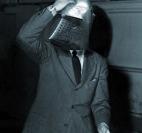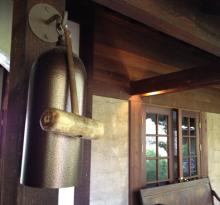I consider myself lucky. I grew up in a time before childhood games became mired in registration fees, and when fresh out-of-the-ground tastes filled our tables. I remember spending entire mornings in my backyard watching earthworms slither in soft mud, then cutting them in two to watch them live past certain death.
By today’s standards, I suppose I was lame.
But my childhood—and that neighborhood—lies within me. Its territories are etched inside me like a hand-drawn treasure map full of sun-drenched meadows and quicksand marshes. My block had unique territories. An alley ran alongside my house where hollyhocks and telephone poles sprouted from its gravel and stood just outside my backdoor. They were pillars of strength—source of landmark, site of olley-olley-in-come-free safety when we played Spud, Sevenup, and Ghost in the Graveyard.
Next door, Mrs. Whitchurch’s rock-encrusted koi pond mesmerized me with its languid, swirling orange and black backs big enough to pet,which I did, even though Mrs. Whitchurch told me not to. Across the street, Mrs. Draggen’s bungalow fronted a botanical maze of lush grapevine arbors over cinder pathways. Sky-high sunflowers and tomato plants towered over bugle-faced daffodils and daylilies. The height and density of that garden could hide me for hours as I imagined myself in snake-riddled dungeons or on swashbuckling pirate ships.
All our imaginations were rich.
On my block the adults knew every kid by name—and didn’t alwayscall out to uskindly. “Trisha, come here and see what you’ve done to my tiger lilies!” Mrs. Henry would scold. “Trisha, I see you lighting matches under that porch. Bring them here, right now!” Mrs. Basolo would screech.
I mostly obeyed—because they were the law.
More uncertain regions lay past the adults’ watchful eyes. First came the park which offered immense, steel swing-sets—the site of my death-defying Superman leaps, jungle gyms where we dared and double-dared each other into head-bursting, half-hour knee hangs, and a forest green sandbox whose splinters could chew my butt off in one clean swipe if I wasn’t careful. Just past the park rolled the golf course, which brought plaid-clad strangers into view.
Beyond that park and the golf course ran the most dangerous region by far: The Canal. It was a noxious river of churning gray that began at Lake Michigan and emptied downstream into the Chicago River. It worried the adults. “Kids have been killed there!” and “Hobos live under the bridge!” I was both terrified of its power and seduced to its sides.
So far from safety.
So far from home.
But above the neighborhood—its sidewalks and common grounds, its mysterious backyards and treacherous sections—hung an irrevocable hierarchy of children. It was the real law that bound us all into ironclad castes. The oldest and strongest dictatedthe young and the lowly—commanding activity, determining behavior, designating turf.
I was of the lowly. My big sister Sally—tall and thick and mean, her angry-kid mouth curled into a snarl most of the time—was of the high. “Get me a blueberry popsicle!” she would sneer, hanging from the top of the jungle gym fortress of the high. I was a serf forced to do her bidding. I would get her one every time. If I didn’t, she wouldn’t let me play. Worse, she would slug me. Hard.
Timeloomed large before me one particular cool summer morning. It was early and I’d dressed in my navy blue P.F. Flyers, a striped tee shirt, and red elastic-band shorts. I trudged along the alley from tree trunk to streetlight to telephone pole, leaning on each for a minute or two as I waited for the day to begin.
I sighed.
When out of nowhere, an obese iridescent fly zigzagged past my ear in bumping rhythms, and I followed it down the gravel-covered alley watching it work its way from honeysuckle trumpet to grapevine tendril. Suddenly, it disappeared into an open garage door.
I opened my eyes wide. I shook my head in disbelief.
It shouldn’t have been, but there it was—unattended. Door open, its silent gaping maw lured me inside. This wasn’t just any garage. This was Sally and her friend Ann’s imaginary stable—a mysterious kingdom as alluring as it was taboo. “Don’t you ever go into our stable. You hear?”
I peered inside. I could barely breathe. The only sound came from that fly bouncing crazily off the grime-smudged window at the far side of the garage. I stared into the cavernous darkness. At first, I couldn’t see anything. I squinted real hard. Then I squinted again. And it all came into view: the tack, the blankets, the water troughs, the leather-braided whips, the feed buckets, the stiff bristled brushes, the wooden-handled brooms, and the hay-lined stalls.
Slowly the fly’s buzz dissolved into a soft snort, which escaped from gently flaring nostrils.
Then they appeared.
Lined before me majesticrumps,hocks, fetlocks and flanks, rippled and gleamed from years of Sally and Ann’s loving attention. I heard another snort. Then another. Soon the whole stable was filled with the mystical neighing and whinnying and stamping and chomping. I thrilled to the symphony around me, closed my eyes and drank it in—near reeling with delight.
Then—ah—I remembered.
There among them all—the cream-colored Appaloosa, the golden-maned Palomino, the regal steel-colored Arabian—would be Alibi, my sister Sally’s Tennessee
Walker. “He’s got the most perfect chiseled star on his forehead,” Sally would boast from the crossbar at the top of the steel swing set.
I looked around to make sure nobody was watching as I stepped across the threshold. I grabbed Alibi’s bridle from a makeshift nail, and walked up behind him. Carefully I slipped the bit into his mouth—I had watched Sally do this so many times before from the alley. “He has a soft mouth,”she would inform me from her roost on the roof of the park’s clubhouse. So, I whispered softly into his attentive, quirky ears to keep him soothed. So afraid that I’d startle him with the sharp edge of reality I held in my hands.
He took the bit just fine. I patted his squared cheek, rubbed his velvet muzzle.
Still clucking to him, I lugged a striped woolen blanket from an old sawhorse and slung it over his back. His withers twitched crazily, hinting at the massive energy waiting to burst out through that deep chestnut hide. And I saddled him.
Heeding Alibi’s stamping hoof, I mounted him neatly. I clucked once to steer him out, ducking my head as we cleared the garage door, and turned him out into the gravel alley past Mrs. Draggen’s garden, Mrs. Basolo’s arched concern, and Mrs. Whitchurch’s wary eyes. When we reached the golf course I eased him into a trot, then a canter and, as his power exploded beneath me, I urged him into a run. The wind of that cool summer day blazed around my ears and burned through my lungs and into my heart, which skittered at the thrill of what I was doing.
Together we galloped over the paths that followed the river churning below us, bottle green and cool. My feet bounced rhythmically in step with his. Weeping willows at the riverbank’s edge flung their tender yellow shoots in our faces. They seemed to be waving—so long, so long to that sneering face of my big sister Sally, so long to the parental zones of my neighborhood.
“Haha,” I cheered loudly. “I’ve got Alibi.”
That morning we rode farther than I’d ever gone before—all the way to a vaulted, wooden footbridgethat ran across the canal. The sound of its eddying thunder grew louder as it raced beneath us. Trembling, I stoodtiptoes in the stirrups and drank it all in.
"Here we are, Alibi!" And that magnificent steed responded with a nicker. Our communication was nothing short of telepathic.
It was then that I realized he was lathered and wet. “You have to walk him and dry him and curry him and clean his hooves. Then you have to give him fresh hay. And water,” she’d lecture me from a branch of the old elm in our backyard. So I reined him towards home, clip clopping back through the golf course and alley, ducking as we reentered the stable. As I unsaddled him, he neighed once, and snorted softly.
So very softly.
“There, there,” I clucked. “Good boy, Alibi.” I strained to hear his soft whinnies and snorts but they seemed to be transforming. All I could hear was that fly bumping against the far window. “Don’t you know you can’t get out from there?” I jeered at the fly’s stupidity.
The light in the stable dimmed.
“What are you doing in here?”
Startled, I turned around, arms raised where I brushed the air with my hands. The intense square of light at the garage’s open door allowed nothing but the cutout of a tall and thick black form.
“I…I…” I brought my arms down to my sides and stared back at the silhouette.
“What do you even think you’re doing in here, you little jerk?” Sally’s fists opened and closed at her sides. “Get out of this stable. Now.” She took a step towards me. “I told you to never touch Alibi.” And with that she leapt into the grease-stained garage.
My heart began to thud in stuttered syncopation. I scoured the empty garage looking for refuge.
Nothing.
Then the fly darted past me heading straight for Sally’s head. She jerked from its path. I saw my chance. I bolted—past my triumph, past the glory of my childhood imagination, and past Sally. Knocking her down I tore down the alley, and raced past the honeysuckle and grapevines until I reached the safety of my own backyard, of those olley-olley-in-come-free pillars of strength. My head pounded and my lungs burned as I gulped fresh air, waiting for my heart to restore its even beat.
And then I smiled.

















